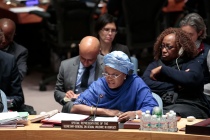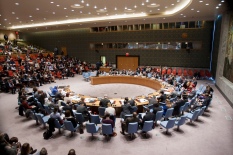“The spotlight is on you and we are coming after you with all the means at our disposal, Zainab Banguara warned perpetrators of sexual violence during conflicts. “Humanity will pursue you and hold you to account.” Jane McClenahan reports.

Zainab Banguara, UN special representative on sexual violence in conflict. Courtesy UN Photo/Evan Schneider
Banguara, the UN Secretary General’s Special Representative on Conflict-Related Sexual Violence, spoke at a Security Council open debate on the issue.
Yet hanging over the Security Council in New York were recent events thousands of miles away in South Sudan, where rebels in Bentiu murdered and raped unknown numbers of civilians in mosques, churches and even hospitals. The UN Mission to South Sudan condemned the use of hate speech on the radio “declaring that certain ethnic groups should not stay in Bentiu and even calling on men from one community to commit vengeful sexual violence against women from another community.”
Echoes of the genocide 20 years ago this month in Rwanda are hard to avoid.
UN Secretary General Ban Ki Moon spoke first at the Council debate, describing sexual violence in conflict as being an “issue of pressing importance” as it “inflicts unimaginable suffering on women, men and boys” and targets society’s most vulnerable members.
He praised progress in the Democratic Republic of Congo (DRC) and Somalia, recalling that until recently the situations in both countries seemed intractable. Yet, now they are showing that progress is possible.
The two countries illustrate the UN effort at a multi-dimensional approach that moves from high-level advocacy to UN teams working in the field, under the auspices of the Special Representative. The co-ordination, Ban continued, ensures they avoid duplication on the ground and “make the best use of limited resources.” The last comment is telling – funding this work has long proven a challenge to the United Nations.
The Secretary General was followed by Banguara, a former foreign minister of Sierra Leone. Banguara spoke forcefully and passionately about the challenges facing the international community.
She admitted that when she took the job two years ago, she had no conception of how difficult the mandate was. Sexual violence causes “the utter destruction of the individual” and “casts a long shadow over our collective humanity,” she said.
Referring to a 2013 trip to Bosnia, she described how perpetrators of sexual crimes during that country’s conflict still roam free and unpunished, reminding their victims of their broken lives. She spoke of how children born of rape are now teenagers who, along with their mothers, lack support services and have received no reparations for their plight.
Banguara acknowledged that progress has been made – for example, “modest but meaningful change” in dealing with governments – but said that the unacceptable reality is this: It is still easy to rape a woman, man or child during conflict with impunity.
Rhoda Misak of the NGO Working Group on Women returned the discussion to the situation in South Sudan. She had reports from the field that the violence is increasing and that women “feel they are sitting there waiting to die.” On the wider issue of sexual violence in conflict, she advocated for a six-point plan that includes ending impunity for perpetrators, offering comprehensive services for survivors, ensuring that cease fire agreements do not provide amnesty for sexual violence, guaranteeing that women’s voices are heard, requiring UN Missions to include all aspects of the peace and security agenda and ensuring that the root causes of the violence are tackled.
Most of those ideas are already in the public domain. Implementation, on limited budgets, remains challenging. It would appear some progress has been made in highlighting the issue but, with events like those last week in Bentiu, and the ongoing abuses in Syria still depressingly frequent, there remains a considerable way to go.
Click here to read the full report to the Security Council.


Reblogged this on restinghack.